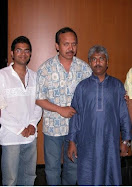Woh jo hum me.n tum me.n qaraar thaa tumhe.n yaad ho ke na yaad ho
vahii yaanii vaadaa nibaah kaa tumhe.n yaad ho ke na yaad ho
Qaraar: Ease, Patience, Quietude, Repose, Residence Rest, Satisfaction, Stability
Woh jo lutf mujh pe the peshtar, woh karam ke thaa mere haal per
mujhe sab hai.n yaad zaraa zaraa, tumhe.n yaad ho ki na yaad ho
Luft: Benignity, Enjoyment, Favor, Grace, Joy, Kindness, Pleasure, Taste, Wit
Pesh-tar: Before, prior
Karam: Benevolence, Benignity, Benedictions, Bounty, Clemency, Favor, Kindness, Largeness
vo naye gile vo shikaayate.n vo maze maze kii hikaayate.n
vo har ek baat pe ruuThanaa tumhe.n yaad ho ke na yaad ho
Gilaa: Complaint, Blame, Reproach, Lamentation
Shikaayat: Ailment, Complaint, Accusation, Illness
Hikaayat: Anecdote, Story, Narrative
kahiin baiThe sab hai.n jo ruu-ba-ruu to ishaarato.n hii mein guftaguu
Woh bayaan shauq ka bar-malaa tumhe.n yaad ho ki na yaad ho
Ruu-ba-Ruu: Face To Face, In Front Of
Ishaarat: Sign, signal; beck, nod, wink, nudge, gesticulation; pointing to, indication, trace, mark; allusion, hint, clue; insinuation, inuendo; love-glances, ogling; dumb-show
Guftaguu: Conversation Discourse, Speech, Talk
Bar Malaa: Open, public, conspicuous; openly, in open day, publicly, in the sight of all, manifest
hue ittefaaq se gar baham, vo vafaa jataane ko dam-ba-dam
gilaa-e-malaamat-e-aqrabaa, tumhe.n yaad ho ke na yaad ho
Ittefaaq: Accordance, Accident, Agreement, Concord, Chance, Event, Opportunity
Gar: If
Baham: Gather, Together, With One Another
Vafaa: Fulfilling A Promise, Fulfilment, Fidelity, Faithful, Sincerity, Sufficiency
Jataana: Admonish, Emphasise
Dam-ba-Dam: Every Moment, Continuously
Malaamat: Animadversion, Blame, Censure, Lesson, Rebuke, Reproach
Aqrab: Nearer; nearest; most near;—s.m. A near relative
Gilaa-e-Malaamat-e-Aqrabaa: Admonitions and Rebukes to a near and dear/loved one
ko_ii aisii baat agar hu_ii jo tumhaare jii ko burii lagii
to bayaa.N se pahale hii bhuulanaa tumhe.n yaad ho ke na yaad ho
Bayaan: Account, Declare, Description, Explanation, Manifestation, Narration, Relate, State Statement, Tale
kabhii ham me.n tum me.n bhii chaah thii, kabhii ham se tum se bhii raah thii
kabhii ham bhii tum bhii the aashnaa, tumhe.n yaad ho ke na yaad ho
Chaah: Affection, Appetite, Choice, Desire, Liking, Longing, Love, Need
Raah: Custom, Fashion, Journey, Means of Access, Method, Passage, Path, Progress, Road, Track, Way
Aashnaa: Acquaintance, Friend, Lover
suno zikr hai ka_ii saal kaa, ke kia ek aap ne wada thaa
so nibaahane ka to zikr kyaa, tumhe.n yaad ho ke na yaad ho
Zikr: Discussion, Remembrance, Memory, Mention
kahaa mein ne woh baat kothi ki, mere dil se saaf utar gayi
toh kaha ke jaane meri balaa, tumhe.n yaad ho ki na yaad ho
Kothi: Mansion, Dwelling, Residence
Balaa: Calamity, Danger, Distress, Trial, Misfortune, Problems
vo biga.Dnaa vasl kii raat kaa, vo na maananaa kisii baat kaa
vo nahiii.n nahii.n kii har aan adaa, tumhe.n yaad ho ki na yaad ho
BigaDnaa: Bungled, Corrupt, To Become Angry, Ruined, Spoil, Tarnish, Vilify, Vitiate
Vasl: Meeting, Union
Maananaa: Agree
Aan: Moment
Adaa: Beauty, Charm, Elegance, Fascination, Grace
jise aap ginte the aashnaa jise aap kahate the baavafaa
mai.n vahii huu.N “Momin”-e-mubtalaa tumhe.n yaad ho ke na yaad ho
Ginna: Enumerate, Count
Baa-vafaa: Faithfulness, Fidelity
Momin: A reference to the poet, Momin Khan Momin
Mubtalaa: Embroiled In

